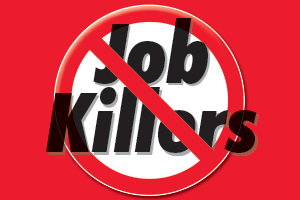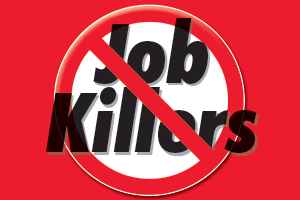 Governor Gavin Newsom yesterday signed legislation co-sponsored by the California Chamber of Commerce that streamlines procedures in the small employer family leave mediation program under the California Family Rights Act. The Governor also signed two bills that will increase the cost of doing business in the state: a CalChamber job killer bill that will increase costs and liability on employers in the garment industry; and a CalChamber oppose bill that significantly expands Cal/OSHA authority.
Governor Gavin Newsom yesterday signed legislation co-sponsored by the California Chamber of Commerce that streamlines procedures in the small employer family leave mediation program under the California Family Rights Act. The Governor also signed two bills that will increase the cost of doing business in the state: a CalChamber job killer bill that will increase costs and liability on employers in the garment industry; and a CalChamber oppose bill that significantly expands Cal/OSHA authority.
Co-Sponsored Bill
AB 1033 (Bauer-Kahan; D-Orinda) establishes a more practical, streamlined procedure for implementing the small employer family leave mediation program established in 2020 by AB 1867 and fixes a drafting error in SB 1383.
In 2020, SB 1383 (Jackson) expanded the family leave requirements under the California Family Rights
Act (CFRA). To alleviate SB 1383’s threat of litigation for small businesses, budget trailer bill AB 1867 of 2020 required the Department of Fair Employment and Housing (“DFEH”) to establish a small employer mediation pilot program. All family leave claims brought against small employers with five to 19 employees could be sent to mediation, instead of directly to court. To initiate mediation, an employer or employee must request mediation within 30-days of receiving a right to sue notice alleging violation of family leave requirements.
AB 1033 fixes issues relating to the implementation of the mediation program by:
- Improving how mediation is initiated under the program and ensuring mediation occurs within a timely manner;
- Requiring the DFEH to inform employees of this requirement, including instructions on how to initiate mediation on all right-to-sue notices; and
- Clarifying that a small employer may stay a civil lawsuit or arbitration proceeding to pursue mediation if the complaint should have been subject to the mediation pilot program.
AB 1033 also adds parents-in-law to the list of family members in CFRA for which an employee can use
leave to provide care. “Parent-in-law” was added as a defined term to CFRA by SB 1383, but was
inadvertently omitted from the list of family members that an employee could take leave to care for identified in Government Code Section 12945.2 (b)(4)(B). That omission left employers uncertain about whether they are required to provide employees time off under CFRA to provide care for a parent-in-law. This bill clarifies that issue.
Harmful Legislation Signed
- Job Killer: SB 62 (Durazo; D-Los Angeles) significantly increases the burden on nonunionized employers in the garment manufacturing industry in California, by eliminating piece rate as a method of payment even though it can benefit the employee, expanding joint and several liability for any wage violations to the entire supply chain, and shifting the evidentiary standards in a Labor Commissioner hearing to limit the ability for an employer to defend against an alleged wage violation. These additional requirements will encourage companies to contract with manufacturers outside of California, thereby limiting the demand and workforce of garment manufacturers in California.
Proponents of SB 62 claim joint liability is necessary to hold liable brands who intentionally pay low contracts that do not cover workers’ wages. That conduct is already illegal under Labor Code Section 2810, which imposes liability on any entity that enters into a contract for the manufacturing of garments where it knows or should know that the price is insufficient to cover workers’ wages.
Nothing in SB 62 will address the problem of underground bad actors in the garment industry evading the law. Instead, SB 62 eliminates piece rate work and allows those bad actors to continue operating as usual while passing the cost and liability to companies that have no control over the workers.
- Oppose: SB 606 (Lena Gonzalez; D-Long Beach) will significantly expand California Division of Occupational Safety and Health (Cal/OSHA) authority by creating a new “egregious employer” category in the Labor Code, and creating a new category of “enterprise-wide” citations that face higher citation amounts based on, at times, evidence at only one location. The job killer tag was removed due to March 25 amendments limiting certain overbroad provisions, but the CalChamber remained opposed due to structural changes to Cal/OSHA enforcement.
Employers across California are in the process of adapting to re-instituting measures as COVID-19 infection rates rise and fall and trying to keep up with rapidly changing state and local health guidelines. At the same time, Cal/OSHA enforcement has been vigorous, and Cal/OSHA is already staffing up due to additional funding in the state budget. In light of these conditions, SB 606 will not improve Cal/OSHA’s staffing difficulties or COVID-19 enforcement – which are already being addressed. It will only add confusion and multipliers and catch well-intentioned employers in its net.


